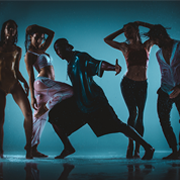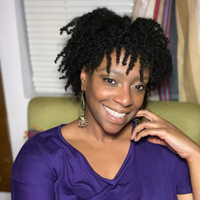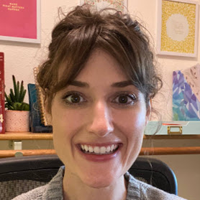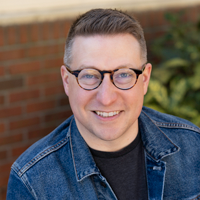
As the COVID 19 pandemic stretched across the globe during the summer of 2020, the necessity of social distancing and isolation hit Performance Studies hard. Perhaps no other subset of the Communication discipline is more dependent on people sharing space together than Performance Studies. Performance Studies retains a genealogical connection to the traditions of elocution and oral performance that are at the foundation of the Communication discipline. Hand in hand with our written scholarship, Performance Studies depends on putting people together in rooms where performance can be created and shared. With the onset of the pandemic, however, we had to reimagine what being “together” could mean. For us, that meant building a new version of the Patti Pace Performance Festival—an event we had all attended and valued as a site of embodied scholarship and community building.
This virtual festival gathered undergraduates, graduate students, and faculty from across the country for two days of performances, lectures, and workshops that explored issues of identity and highlighted the contributions of Black performance scholars.
In February 2021, with the generous support of our home departments and institutions, we worked together to create “Patti Pace Performance Festival Presents: Meeting the Movement.” This virtual festival gathered undergraduates, graduate students, and faculty from across the country for two days of performances, lectures, and workshops that explored issues of identity and highlighted the contributions of Black performance scholars. Our efforts represent a step toward fostering an explicitly anti-racist future for Performance Studies. In this essay, we tell the story of “Meeting the Movement” before concluding with some thoughts on creating a festival like this one and de-centering whiteness in Communication scholarship writ large.
The summer of 2020 brought a dramatic, painful, long-needed, and ultimately productive racial reckoning to America. The season of protests, which was sparked by the horrific and tragic deaths of Breonna Taylor, Rayshard Brooks, and George Floyd—among others—at the hands of police, pushed conversations about race and identity to the top of mind for the entire nation. When we began working on the virtual festival, the need to rethink how Performance Studies supported Black students and scholars felt visceral and urgent. When the three of us met virtually to discuss how we could convene the festival in a virtual format, several questions emerged:
- What are the possibilities and limitations of performance as resistance?
- How has this moment altered, enhanced, and/or challenged our understandings of performance pedagogy, as well as performance of identity, culture, history, empathy, and storytelling?
- How is Performance Studies complicit in perpetuating white supremacy?
- How, as an area of study, are we meeting the movement?
As white people, McGeough and Parrott were acutely aware that they are the beneficiaries of a system that often excludes and marginalizes people of color and that these systems extend into our discipline’s structures and histories of performance festivals. Huell, a Black performance scholar, confirmed what we already knew: that neither the halls of academia nor the space of performance festivals are nearly welcoming enough to Black scholars. We understood that any effort to innovate the festival virtually at such a time of urgency and unrest should be clearly and purposefully Black-centered. Through much conversation, we agreed that the theme, “Meeting the Movement,” would act as a call to rethink performance theory and practice in the present context, and would highlight the contributions of Black performance scholars as a first step toward working to decenter whiteness.
The Tradition of Performance Festivals
Performance Festivals have a long and meaningful history in the United States, serving as sites where undergraduates, graduate students, and faculty come together to learn about and celebrate performance. Participants travel across the country to present and witness performance of all kinds—personal narrative performance, performance ethnography, literary performance, devised performance, oral histories, and more avant-garde productions. At their heart, performance festivals apply theory in ways that both research and common sense tell us support student learning. These festivals were originally focused on the oral interpretation of literature in the post-World War II era, experiencing a renaming and rebranding when the study of oral interpretation transformed into what we now know as Performance Studies.
Originally called the Georgia Performance Festival, the Patti Pace Festival was renamed for a scholar who enthusiastically supported the festival. Since then, it has been hosted by numerous institutions across the Southeast and Midwest. Representatives from institutions that grant Performance Studies Ph.D.s, such as Louisiana State University and Southern Illinois University Carbondale, regularly attend the festivals, as do a wide variety of undergraduate programs from around that country. Given the scope, history, and the importance of performance festivals, we felt a virtual version of the Patti Pace Festival could help bring Black voices to the foreground.
The Mission of “Meeting the Movement”
None of us had any experience with creating a virtual festival or conference, so before we could take off into these uncharted waters, we needed something to guide us. Together we drafted a mission statement for the festival. It was meant to communicate our focus to participants and to act as our north star, keeping our enterprise on track and offering answers to questions as they arose. Our mission had four parts:
- Display, discuss, and archive the work of Performance Studies practitioners
- Create connections between Performance Studies practitioners, both present and future, in a virtual setting
- Facilitate conversations about important topics related to the future of Performance Studies
- Integrate the festival experience into Performance Studies curricula
This four-part mission was preceded by a paragraph that framed the festival. Alongside a general description of the transition from face-to-face to an online festival, we added, “We believe the future of Performance Studies must be deliberately inclusive and actively anti-racist. People who have historically been marginalized in the festival experience are warmly welcomed to participate. The Virtual Performance Festival is dedicated to keeping the festival experience alive and thriving during these rapidly changing times.” This passage in particular was our north star as we imagined what we wanted the festival to accomplish.
We believe the future of Performance Studies must be deliberately inclusive and actively anti-racist.
Gathering Guests to Meet the Movement
From the beginning, we knew that one strength of the virtual format was its potential to bring several guest presenters to the festival. Traditionally, the Patti Pace Performance Festival has featured one festival leader who offered a lecture and workshop during the weekend. However, the virtual format allowed guests to Zoom into the festival to present, reducing costs and logistics challenges.
 We sought out Black performance scholars, each at a different career stage. Nikki Yeboah, Assistant Professor at San Jose State University; Elizabeth Whittington, Assistant Professor at Prairie View A&M University; and Renée Alexander Craft, Associate Professor at the University of North Carolina Chapel Hill, joined co-festival organizer Jade C. Huell, Associate Professor at the California State University Northridge, in discussing: the importance of mentorship and inclusion for students of color, the potential of performance scholarship for activating racial justice, and thoughts on the future of the discipline. Craft also offered a discussion of her prodigious and prestigious record of scholarship and teaching. Sharell Luckett, Associate Professor at the University of Cincinnati, led a workshop based on her bestselling book, Black Acting Methods (written with co-author Tia M. Shaffer). Northwestern University Professor Emeritus D. Soyini Madison delivered the keynote address, introducing the festival audience to her work on poetically examining performance as cosmic energy expressed through anti-capitalist justice and the concept of beauty. The festival came to a close with a performance from Javon Johnson, award-winning poet, Assistant Professor, and Director of the African American and African Diaspora Studies Program at the University of Las Vegas. It was, by any measure, a stunning lineup of scholars gathered in one (virtual) place at one time.
We sought out Black performance scholars, each at a different career stage. Nikki Yeboah, Assistant Professor at San Jose State University; Elizabeth Whittington, Assistant Professor at Prairie View A&M University; and Renée Alexander Craft, Associate Professor at the University of North Carolina Chapel Hill, joined co-festival organizer Jade C. Huell, Associate Professor at the California State University Northridge, in discussing: the importance of mentorship and inclusion for students of color, the potential of performance scholarship for activating racial justice, and thoughts on the future of the discipline. Craft also offered a discussion of her prodigious and prestigious record of scholarship and teaching. Sharell Luckett, Associate Professor at the University of Cincinnati, led a workshop based on her bestselling book, Black Acting Methods (written with co-author Tia M. Shaffer). Northwestern University Professor Emeritus D. Soyini Madison delivered the keynote address, introducing the festival audience to her work on poetically examining performance as cosmic energy expressed through anti-capitalist justice and the concept of beauty. The festival came to a close with a performance from Javon Johnson, award-winning poet, Assistant Professor, and Director of the African American and African Diaspora Studies Program at the University of Las Vegas. It was, by any measure, a stunning lineup of scholars gathered in one (virtual) place at one time.
All of our invited presenters were Black. Most of the festival attendees were not. This helped advance our goal of decentering whiteness and centering Blackness as a major force within Performance Studies.
All of our invited presenters were Black. Most of the festival attendees were not. This helped advance our goal of decentering whiteness and centering Blackness as a major force within Performance Studies. As scholars, we tend to reach for and teach what we already know; the things we were taught were important. And most scholars know that Performance Studies has historically excluded Black people and Black culture, which means the tool kit we often reach for does not include Black people or Black culture. Opening up the performance festival space to these scholars—some who are relatively early in their careers and some, like Madison, who are legends in the field—was an effort to widen the scope of the perspectives we consider and to more wholistically meet the moment in which we currently find ourselves.
Just as important, the students attending and presenting at the festival reflected the diversity of race and identity found in many (if not most) classrooms. Many of these students don’t have faculty who look like them to offer them mentorship at their home institutions. We believe that our featured guests offered a glimpse of what such mentorship might look like. It is our hope that this event helped inspire the next generation of scholars of color, showing them their rightful place as part of the future of Performance Studies.
Submissions and attendance for the festival exceeded our expectations. Seventeen institutions and organizations were represented by presenters and respondents to performances, with well over a dozen other institutions represented in the audience. We estimate that each day of the festival drew between 75 and 100 participants. Throughout the weekend, the Zoom chat burst with supportive words and constructive feedback for presenters who had taken the leap of faith necessary to share their work in the digital space.
We informally solicited feedback from a handful of attendees. Deanna Shoemaker, Associate Professor at Monmouth University, told us that the virtual format allowed her to share her students’ work at a festival for the first time. Shoemaker went on to praise the event: “This supportive, warm gathering focused on social justice movements felt like a lifeline, honestly, and modeled an accessible and inclusive way to celebrate, challenge, and learn together.” Jay Allison, Associate Professor Emeritus at the University of North Texas, noted that “the panels were interdisciplinary, including faculty and students from ‘non-performance’ disciplines who would not otherwise have ever had a festival experience. This interdisciplinarity, which has been an academic priority for years, was a learning experience for everyone who attended because it so clearly illustrated the way that narrative and performance methodologies inform so many academic disciplines in the arts and humanities.” The most moving response came from Laura Oliver, a Ph.D. student at Louisiana State University. Oliver wrote, “For the first time in my academic career, I did not feel lonely and alienated as a festival attendee because I was in the presence of other African American performance practitioners who have radically transformed social conditions for people of color in academia. While the integration of diverse voices and perspectives is long overdue in traditional Performance Studies spaces, the festival organizers created a sustainable structure to transform the field beyond a virtual platform that will continue to highlight the importance of art and social justice.” Laura’s response captured our mission: to create an inclusive space for imagining the future.
The Challenge of the Future
As we now look to the future and the potential for another festival in the spring of 2022, we will be guided by the lessons we learned and a handful of challenges that may be reframed as opportunities. First, this festival taught us that performance is limited in its ability to enact change, but it is an excellent mechanism for making the previously invisible visible. In this case, we highlighted the work of Black scholars and student performances that put inequity on display. The very fact that this festival felt unique reveals the ways the histories of our disciplines are exclusionary. Our disciplinary textbooks and, we would argue, some of the foundational assumptions of Communication scholarship, exclude Black culture and Black people. As an exercise in visibility, Meeting the Movement taught us what is so often missing in our work.
Next, organizing this festival underlined the importance of securing an ongoing source of funding for lasting structural change. While virtual conferences and festivals provide the opportunity for more guest presenters and increased accessibility, they also require those presenters be compensated for their time. This year, we were able to redirect funds that usually would have supported in-person performances on our campuses for this virtual festival. But as the country “reopens,” those live performances will return and new funding will be required to support the festival. How we spend our money is one way we demonstrate our priorities. Academic institutions need to spend money supporting events like Meeting the Movement to enact lasting structural change.
This process taught us that the labor of equity, diversity, and inclusion work needs to be valued within the formal structures of the academy.
Third, this process taught us that the labor of equity, diversity, and inclusion work needs to be valued within the formal structures of the academy. Each of us volunteered to make this festival come together in addition to our existing teaching, research, and service workloads. It was, in some ways, a labor of love. But love, as they say, won’t keep the lights on. Finding ways to account for equity, diversity, and inclusion work and national-level service within the framework of academic workloads can present challenges. In our view, administrators at all levels need to recognize and reward the importance of work that fosters inclusion in the academy. Otherwise, equity, diversity, and inclusion work will fall into the hands of a few committed people willing to go the extra mile instead of becoming interwoven into the fabric of our collective work.
Finally, we’ve learned that sustaining a festival like this one raises important questions as we look forward. Can we collect a registration fee to defer costs and, if so, where would the money go? How can we ensure continued institutional support in the face of leadership changes? What happens when one of the original organizers needs a break to give attention to other important responsibilities? All of these challenges suggest opportunities for individuals and institutions to support this important work to improve our discipline. We all need to recognize the importance of events like Meeting the Movement in undermining white supremacy and encouraging scholars of color.
We have no illusions that one festival will have a permanent effect on the problems of disciplinary inclusion and representation. Those problems are deeply entrenched, and it will take a long time and many hands to bring them out into the light. We know that the work of creating a more inclusive future for Performance Studies in particular, Communication Studies in general, and academia writ large has barely begun. And we know that the work is primarily work for white faculty and administrators who have benefited from the systemic oppression of people of color. We know all that, and more. But, we also collectively believe the axiom, “you can’t be it until you see it,” which means that imagining a new future starts with seeing a glimpse of that new future for the first time. We issue this challenge to all of our colleagues: What will you do to improve inclusion and representation in your corner of the discipline?
ABOUT THE AUTHORS

JADE C. HUELL is an artist-scholar in the area of Performance Studies and Associate Professor in the Department of Communication Studies at California State University Northridge (CSUN). Huell’s research rests at the intersections of live performance practice, African American Studies, and Memory Studies. Her working book project traces nostalgia and the aesthetics of memory in Black diasporic performances of affiliation with the African continent. Huell is the Director of CSUN Performance Ensemble: Creatives for Social Change, a multidisciplinary collective of CSUN students that create original social justice performance. Huell’s work with the ensemble earned her the Organization for the Study of Communication, Language, and Gender’s national Creative Expression Award in 2019 and her creative and performed scholarship as writer, director and performer also earned her the Exceptional Creative Accomplishment University Award in 2020.

DANIELLE DICK MCGEOUGH is a scholar-artist interested in how performance, as a mode of communication, is used for collaborative problem solving, community building, and advocacy work. She is currently an Administrative Fellow in the Office of the Provost at the University of Northern Iowa, where she oversees a program called Cultivating Justice: A Quest Toward Racial Equity. McGeough is fascinated by how everyday life performances (i.e., routine family storytelling or bathroom practices) maintain, reproduce, and challenge cultural norms. McGeough hopes to help students cultivate curiosity and find joy in the learning process. She views the theatre as a classroom and a laboratory for students to research, play, experiment, and learn about themselves and others.

CHARLES PARROTT is an Associate Professor in the Department of Theatre & Performance Studies at Kennesaw State University (KSU). He is the Director of the KSU Tellers, a student storytelling ensemble that has performed at regional, national, and international conferences and festivals. In 2020, Parrott was awarded Kennesaw State University’s Outstanding Teaching Award and named Arts & Humanities Mentor of the Year by the Council on Undergraduate Research. He is the Vice-Chair Elect of NCA’s Performance Studies Division.

